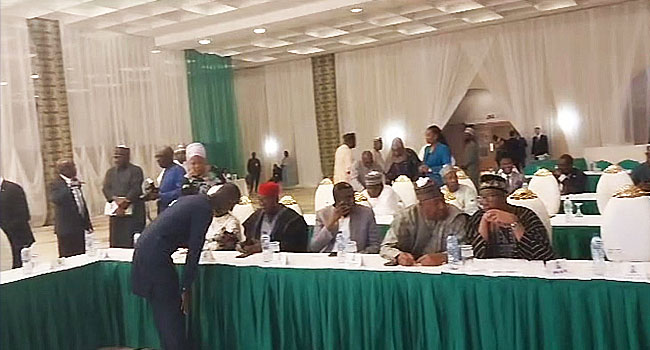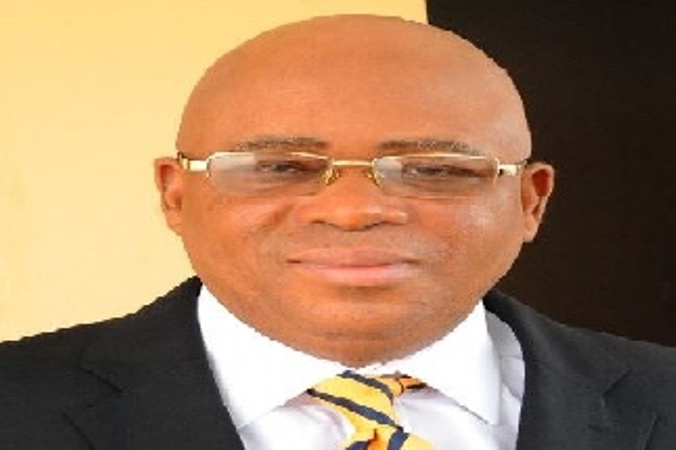Minimum Wage: Your Demand Should Be Reasonable- NGF Tells Labour
The Nigeria Governors’ Forum, on Thursday, emphasised the need for the government and organised labour to come up with a sustainable minimum wage in the ongoing negotiations.
The NGF, which made the call in a communique issued at the end of its virtual meeting and signed by its Chairman and Kwara State Governor, AbdulRahman AbdulRazaq, assured labour of governors’ commitment to pay the workers an improved wage.
In response, the Nigeria Labour Congress and Trade Union Congress warned the state governors against defaulting on the new minimum wage that would be approved during the ongoing negotiations.
In January, President Bola Tinubu constituted a tripartite committee comprising government, labour, and private sector representatives to assess the N30,000 minimum wage implemented during former President Muhammadu Buhari’s tenure.
Recently, the two primary labour organisations, the NLC and the TUC presented a proposal of N615,000 minimum wage to the committee.
During the May Day celebrations on Wednesday, the government refrained from announcing a new minimum wage, citing its reluctance to accept labour’s proposal.
However, the NGF, in its statement, said it was assessing each state government’s fiscal capacity and the potential effects of different proposals to determine an enhanced minimum wage that could be sustained by the states.
The communique read in part “The forum celebrates with workers across the country for their dedication to service and patience as we work with the Federal Government, labour, organised private sector and relevant stakeholders in arriving at an implementable national minimum wage.
“While we acknowledge various initiatives adopted of recently by way of wage awards and partial wage adjustments, it is imperative to state that the 37-member tripartite committee inaugurated on the National Minimum Wage, is still in consultation and yet to conclude its work.
“As members of the committee, we are reviewing our individual fiscal space as state governments and the consequential impact of various recommendations, to arrive at an improved minimum wage we can pay sustainably. We remain committed to the process and promise that better wages will be the invariable outcome of ongoing negotiations.”
Speaking on the governors’ pledge, the TUC Vice President, Tommy Etim, argued that the new minimum wage would be binding on the governors.
“Governors increasing wages are taking individual decisions as the new minimum wage hasn’t been drafted. What will be binding on governors is what is agreed upon at the federal level and that is why governors are on the committee,’’ he said.
On when the committee would meet following its inability to reach a consensus last Monday, a top official of the NLC, who insisted on anonymity because he was not authorised to speak on the issue, said, “There is no fixed date yet for the meeting between the minimum wage committee and the Federal Government.”
The governor in his May Day address promised to implement the new minimum wage as soon as all processes were concluded.
“We will continue to review our responses within current realities, including the implementation of another minimum wage as soon as all processes have been concluded,” he said.
Commenting on the NGF pledge, Osun State Commissioner for Information and Public Enlightenment, Kolapo Alimi, said the state would wait for the National Minimum Wage Committee to conclude its assignment before it would open negotiations with Osun workers.
Alimi, who said the Adeleke administration would not want to pre-empt the outcome of the national negotiation on a new wage, noted that the state would soon inaugurate a negotiation committee on the issue.
“We don’t want to be pre-emptive. All states you mentioned are free to act, but in Osun, we will wait for the National Minimum Wage Committee to conclude its assignment. We will soon set up a negotiation committee here too,” Alimi said.
Meanwhile, the President of the Nigeria Labour Congress, Joe Ajaero on Thursday night explained how the Congress arrived at the N615,000 minimum wage proposal which it submitted to the Tripartite Committee on minimum wage.
Recent reforms in Nigeria including the removal of fuel subsidy and the unification of the foreign exchange market have pushed the cost of living to newer levels. Inflation figures hit 33.2 per cent in March, further compounding a troubled economy.
Labour unions and the Federal Government have since been locked in negotiations over measures including a new minimum wage to cushion the impacts of the harsh economy.
The NLC is proposing a N615,000 monthly salary for workers, a jump from the current N30,000. Although many believe it is unrealistic, the labour union believes many states can pay it if they get their priorities right.
Ajaero in the statement said the figure was a product of a painstaking effort through which we captured the cost of living of Nigerian workers and masses in all parts of the country. It was essentially an outcome of an independent researchconducted by the NLC and TUC on the cost of meeting the primary needs of an average family around the country. Our research was based on a family with both parents alive and four children without the burden of having other dependents with them.
“A questionnaire was designed and sent to all the State Councils of NLC and TUC from where these questionnaires were sent to our members in all the Local government areas in the country to gather the monthly cost of living for the average family as described above. Below is a summary of our findings and we hope that this will enable Nigerians understand what propels our demand so that better clarity is made to create better engagement around the ongoing National Minimum Wage Negotiation process,” the labour leader explained.
Ajaero further noted that the union arrived at the figure before the increase in electricity tariff and the recent scarcity of Petrol across the nation leading to the appearance of long queues with attendant increased transport fares.
He said Any figure below this amount becomes a starvation wage and condemns Nigerian workers and their families to perpetual poverty.





